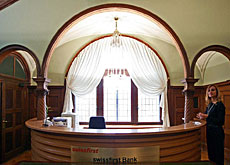Bank merger fuels suspicion of insider trading

Seemingly inexplicable investment decisions by some pension funds linked to banks Swissfirst and Bellevue are being probed on suspicion of illegal insider trading.
Federal and cantonal authorities are investigating why pension funds sold stock ahead of a merger between the two banks, thereby depriving themselves of substantial gains.
Allegations in the media suggest that some fund managers at the two banks bought the stock for their personal accounts.
On Monday, one fund – Rieter – declared there was no indication of “irregularities” related to its dealings with shares in Swissfirst, days before it merged with Bellevue.
The funds, which sold the stock in what appears a concerted fashion on September 8 and 9, saw the Swissfirst share price soar by almost 50 per cent a day after the September 12 merger announcement.
They were therefore losing out on a capital gain of more than SFr20 million ($16.12 million) for having sold the Swissfirst shares, according to the NZZ am Sonntag newspaper.
After being gagged at first by a district court from revealing names, the newspaper reported that among the funds that sold stakes were Siemens, Roche, Coop and Rieter.
Questions
At the heart of the matter are the questions who knew what and when about the impending merger, and what prompted individual pension funds and individuals to sell shortly before the merger announcement.
The Federal Banking Commission in Bern is not the only watchdog that is sniffing for evidence into what actually happened. A number of pension fund authorities, notably in Zurich and Basel, have also launched investigations.
The spotlight has also fallen on Swissfirst CEO Thomas Matter, who is reported to have made SFr50 million on the deal.
He told several newspapers last week that the share transaction between Swissfirst and Bellevue creating the merger had been “blessed” by a Zurich prosecutor so that he had protection against any accusations of insider trading.
But prosecutor Christian Weber in canton Zurich has rejected this claim. “That is not true. We never gave a legal opinion on this matter,” he reportedly said.
While no one has made any firm accusations in the case, journalists have been not been idle in trying to disclose what they consider abnormalities surrounding it.
The most spectacular story has been revealed by the mass-circulation Blick tabloid of Zurich.
Grandiose villa
It disclosed on Saturday that the manager of Rieter’s pension fund, Jürg Maurer, moved into a luxury villa costing an estimated SFr20 million at the end of last year.
While Maurer’s taxable assets were provisionally “only” SFr480,000 in 1999, they had jumped to more than SFr43 million in 2002 and well over SFr68 million in 2004.
The newspaper reminded three of the seven cabinet ministers of their duties in creating rules for transparency, improved supervision of pension funds and stricter controls on insider trading.
On Monday, the newspaper revealed that the tax authorities had only known about his millions of assets since 2002 because until then he had not filled out a tax form.
“I simply did not have time for the tax declaration,” the newspaper quoted him as saying.
The Rieter industrial group’s pension fund reported on Monday that it sold 40,000 Swissfirst shares or half of its shareholding before the merger announcement but had found no irregularity in the transaction.
swissinfo with agencies
The Swissfirst and Bellevue banks announced their merger on September 12, 2005.
Trading in Swissfirst shares increased dramatically at the end of last August and before the merger announcement.
Under the terms of the merger, Bellevue’s staff, which owned the bank, would acquire up to a 50% stake in Swissfirst, with Swissfirst in turn acquiring Bellevue’s operating business.
Shares in Swissfirst soared by almost 50% after the merger announcement.
There are two types of insider trading – legal and illegal.
Illegal insider trading is the buying or selling of a security by insiders who possess information that is still not public. This puts insiders (people with for example confidential information about a company) in breach of their fiduciary duty.
A common misconception is that only directors and upper management can be convicted of insider trading. Anybody who has material and non-public information can commit such an act.
Insiders don’t always have their hands tied. Insiders legally buy and sell stock in their own company all the time. Trading is restricted and illegal only at certain times and under certain conditions.

In compliance with the JTI standards
More: SWI swissinfo.ch certified by the Journalism Trust Initiative

You can find an overview of ongoing debates with our journalists here. Please join us!
If you want to start a conversation about a topic raised in this article or want to report factual errors, email us at english@swissinfo.ch.